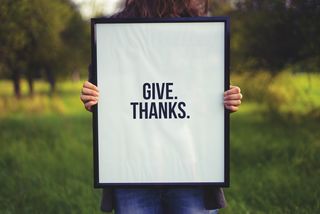Mindfulness
3 Mindful Eating Tips to Savor Thanksgiving
How mindfulness can transform your holiday
Posted November 18, 2017
There is a lot of panic and hysteria surrounding Thanksgiving. The Internet is filled with misguided tips such as such as “dress to impress in tight clothing so you’ll feel more uncomfortable more quickly” (because the answer to our problems is making ourselves feel more uncomfortable?), “eat mashed cauliflower instead of mashed potatoes” (cauliflower is delicious in it’s own right but no matter how you dice it, it’s not a potato), and “wait until food has been picked over so it looks less appetizing” (why in the world wouldn’t we want food to be appetizing?). The message is clear: our bodies can’t be trusted and left to our own devices we’ll drown in a sea of candied yams. Here are three tips to help you navigate Thanksgiving (and the other 364 days of the year), premised on the revolutionary ideas that your body in fact is not broken and food should be enjoyable. I promise I won’t encourage you to microwave an apple and pretend it’s a pie.

1.) Eat what you want.
Sounds simple, right? We spend so much of our lives immersed in diet-culture, obsessing over what we should and shouldn’t eat that sometimes we forget to consider what we actually want. Peruse the Thanksgiving offerings and see what foods look appealing to you. Eat those. Taste them. See what you enjoy the most and go back for seconds if you want more. Don’t forget to take home leftovers! Thanksgiving pulls for a “now or never” mentality, in which we think we need to eat as much as we can tonight because we’ll never have these foods again (at least not until next Thanksgiving). In reality, these foods are available to us whenever we want them. Who says we can’t make stuffing in July or pumpkin pie in February? Taking leftovers home with you reinforces the idea that you don’t have to eat it all now—there will be more tomorrow.
2.) Judgment-Free Zone
We are our own worst critics. We often say things to ourselves that we wouldn’t dream of saying even to our worst enemies, especially around our eating and our body. This noise makes it very difficult to actually hear the signals that our body is sending us. This Thanksgiving, let’s take a break from the relentless self-flagellation and practice the novel idea of being kind to ourselves. When you notice critical, harsh, or judgmental thoughts creeping in, simply observe this, label the thoughts as “criticism,” “judgment,” or even just “thinking,” and shift your awareness out of your head and into the present moment, focusing your full attention for a moment on your breathing. As we try to quiet our inner bullies, try to also carry an intention of self-care and compassion for the day. How can you nourish yourself today? What do you need to have an enjoyable holiday?

3.) Gratitude
It is Thanksgiving after all, so what do you feel thankful for about your body? While most of us can conjure up a list miles long of things we don’t like about our body, we are often stumped to think of things we appreciate about our body. Do your legs carry you where you need to go? Do your arms hold your loved ones close to you in a hug or cuddle? Does your belly digest all that delicious food and nourish your cells with energy? Do you love the way that your curves look in a new outfit? Has your body fought off illness or recovered from an injury this year?
For more Thanksgiving mindful eating tips, check out my previous post Surviving Thanksgiving: Eat Stuffing Every Day.
Dr. Alexis Conason is a clinical psychologist specializing in the treatment of psychological issues related to bariatric surgery, overeating disorders, body image dissatisfaction, and sexual issues. She is the founder of The Anti-Diet Plan, a mindfulness based program to help you stop dieting and start eating in attunement with your body. Sign up for her free The Anti-Diet Plan 30-day starter course today. Follow her on Twitter and like her on Facebook.


